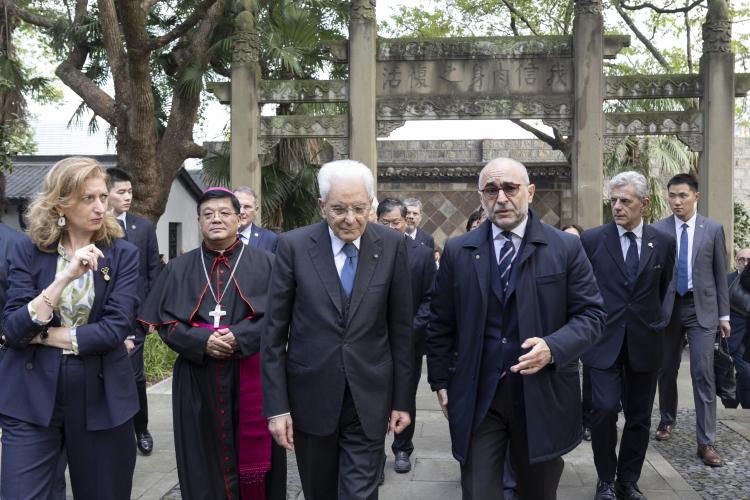During his recent state visit to China, Italian President Sergio Mattarella paid tribute to the Jesuit missionary Prospero Intorcetta, underscoring the significant contributions of Italian Jesuit missionaries to cultural exchange between two countries.
On November 11, President Mattarella visited the cemetery of Catholic missionaries in Hangzhou, Zhejiang Province, where he honored the tomb of Prospero Intorcetta. The visit was accompanied by Catholic bishops Joseph Yang Yongqiang and Zheng Jiamao, as reported by Chinese Catholic newspaper Faith Weekly.
Intorcetta, born in Sicily in 1626, arrived in China in 1659 as a Jesuit missionary. He was one of the outstanding figures in the Chinese Rites controversy. He is also remembered for being the first European to translate Confucian works into Latin, helping bridge Chinese and European intellectual traditions. In addition, Intorcetta played a significant role in the formation of the first Jesuit mission school in China.
Faith Weekly said, “In 1662, he completed and published the first installment of translations for the first and third books of Confucius' works, titled Sapientia Sinica (Chinese Wisdom). By 1667, he completed the second phase of translation work, including The Doctrine of the Mean (Zhongyong). It is this detail that was recalled during a conversation between President Xi Jinping and President Sergio Mattarella.”
During his visit, Mattarella also highlighted the broader legacy of Italian Jesuit missionaries.
On November 9, President Mattarella delivered a speech at Peking University, recognizing the significant contributions of Italian Jesuit missionaries such as Matteo Ricci, Michele Ruggieri, and Prospero Intorcetta. These scholars were among the first sinologists in the Western world to spread Chinese knowledge in Europe.
He also acknowledged Alessandro Valignano, who introduced the concepts of "adjustment" and "inculturation" within Christian thought, thus pioneering intercultural dialogue. Valignano, who died in 1606 in Macau, had commissioned the construction of St. Paul’s College, which remains a symbol of the city to this day.
In his remarks, President Mattarella said, “Indeed, culture thrives on mutual enrichment and not only on the reflection of one’s individual roots. It offers the instruments with which to understand the nature of diversity and to enjoy the benefits of dialogue.”
In his talk with President Xi Jinping on November 8, Mattarella remarked that the year marks the 700th anniversary of the death of Marco Polo, whose connections with China symbolize the enduring friendship between the two nations. On the same day, he visited the exhibition “Journey of Knowledge: Marco Polo’s Travels and His Legacy between East and West” held at the World Art Museum in Beijing.
In Hangzhou, President Mattarella previewed the Venice Biennale Exhibition titled “The Perfect Way–Hangzhou, the City of Heaven by Marco Polo” at the Chinese Academy of Fine Arts; and attended a performance of an extract from the opera “Marco Polo” at the Zhejiang Conservatory of Music on Sunday 10th.












